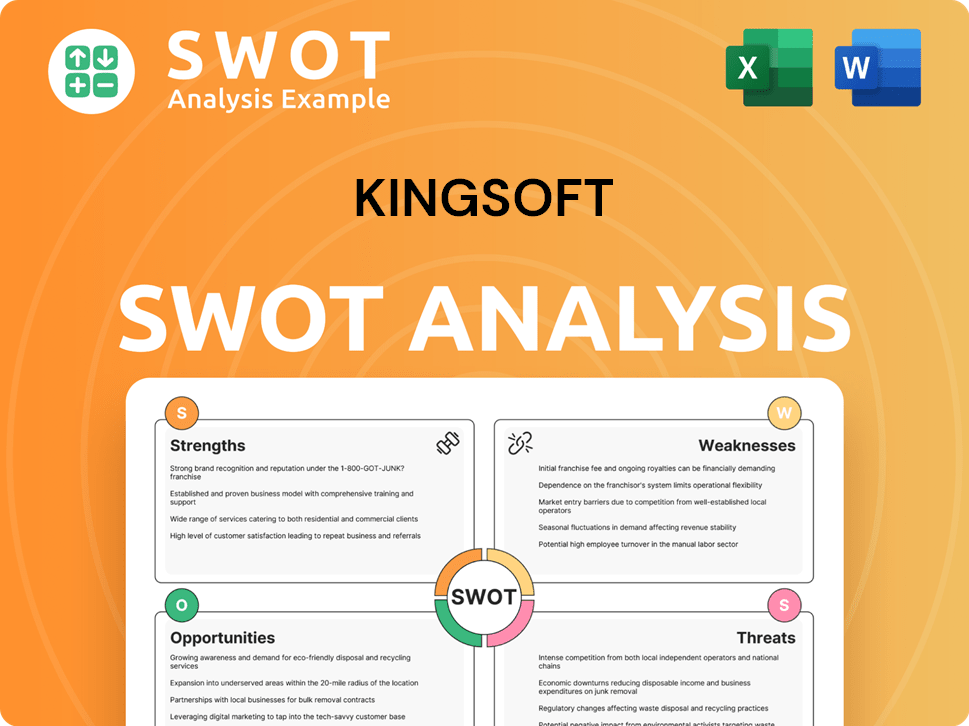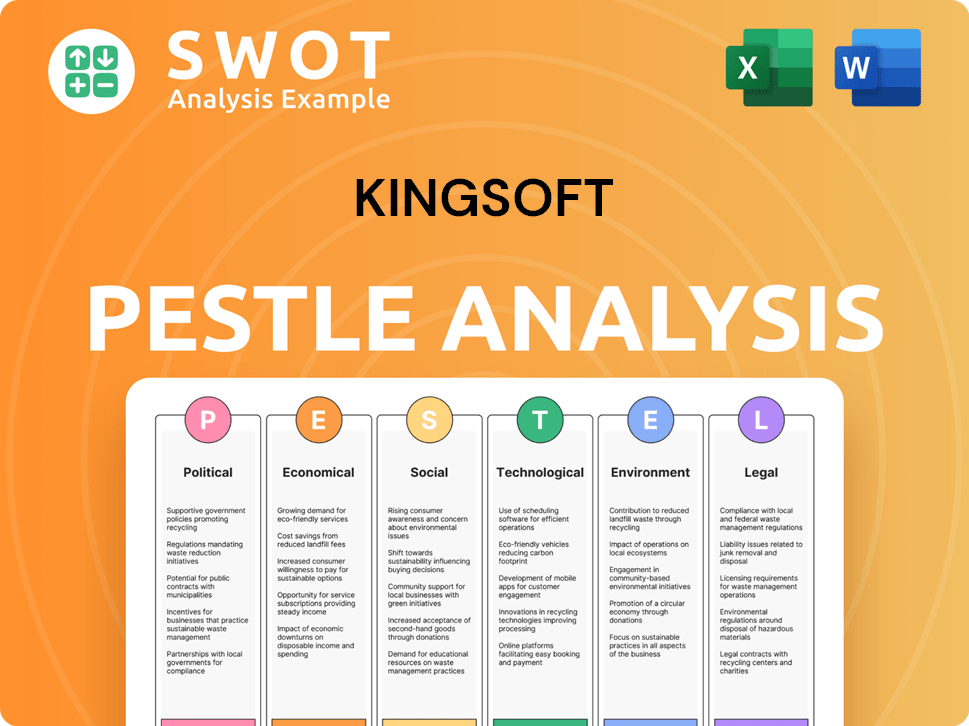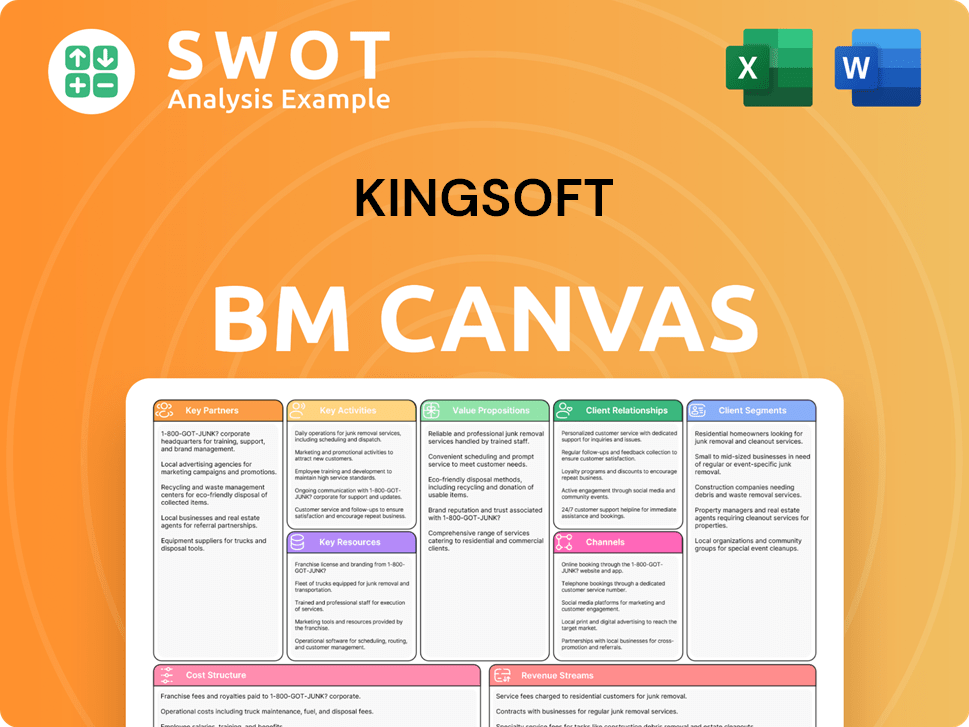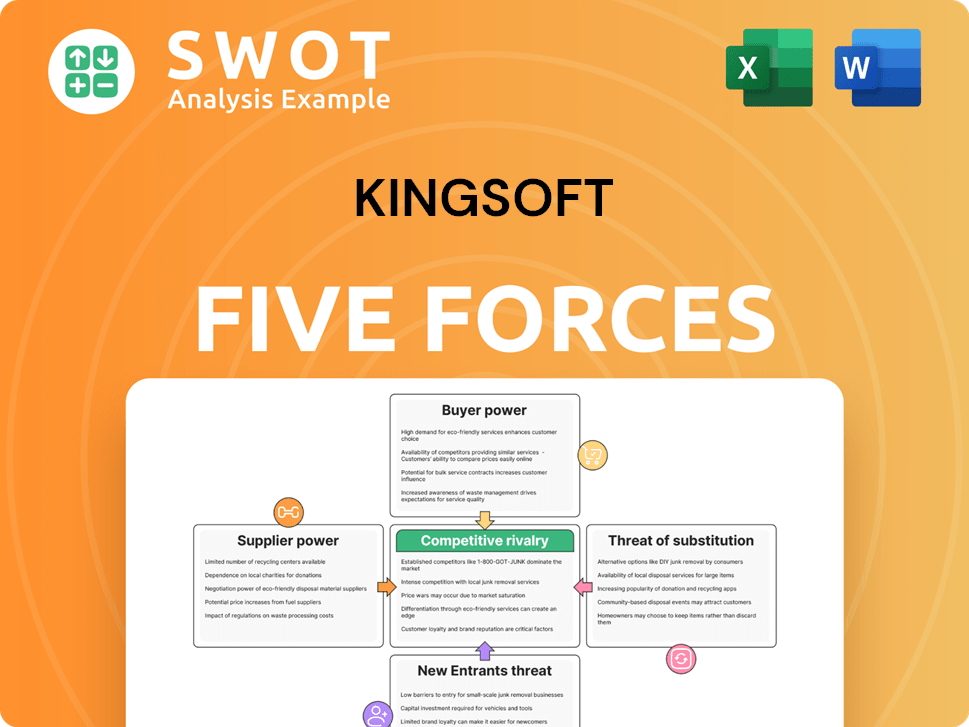Kingsoft Bundle
How Well Do You Know Kingsoft?
Journey back to 1988 and discover the remarkable Kingsoft SWOT Analysis of a company that reshaped China's tech landscape. From its humble beginnings in Shenzhen, this Chinese software company has weathered decades of innovation and competition. Explore the Kingsoft history and uncover the pivotal moments that shaped Kingsoft Corporation into a tech giant.

This deep dive into the brief history of Kingsoft Corporation will illuminate its early struggles and triumphs, including the development of Kingsoft software like WPS Office. Learn about Kingsoft's founder and the company's adaptation to the ever-changing market. We'll examine Kingsoft products, key milestones, and its impact on the Chinese software market to understand its current status.
What is the Kingsoft Founding Story?
The story of Kingsoft, a prominent Chinese software company, began in 1988 in Shenzhen, China. This marked the genesis of a company that would become a significant player in the Chinese software market. The company's early days were defined by a clear vision to address the emerging needs of personal computer users in China.
The driving force behind Kingsoft was Qiu Bojun, often celebrated as the 'father of WPS 1.0' and a pioneering figure in Chinese programming. His ambition was to create software tailored for the Chinese market, filling a gap in the early days of personal computing in the country. This focus set the stage for Kingsoft's initial success.
Qiu Bojun's dedication is exemplified by his creation of WPS 1.0, a word processing system. The entire software was coded single-handedly by Qiu Bojun in a Shenzhen hotel within a year. Released in 1989, WPS 1.0 quickly dominated the Chinese market, achieving a remarkable market share of approximately 90% before the arrival of Microsoft Office in China. The company's initial connection with Hong Kong Kingsun, a PC manufacturer, evolved, and Kingsoft later established its headquarters in Beijing in 1994. The early success of WPS 1.0 provided a solid foundation for the company's future growth and expansion.
Kingsoft's founding was marked by key milestones that shaped its trajectory in the Chinese software market.
- 1988: Founded in Shenzhen, China.
- 1989: Release of WPS 1.0, the company's first major product.
- Early 1990s: Dominated the Chinese market with WPS 1.0.
- 1994: Established headquarters in Beijing.
For a deeper understanding of Kingsoft's strategic positioning, consider exploring the Target Market of Kingsoft.
Kingsoft SWOT Analysis
- Complete SWOT Breakdown
- Fully Customizable
- Editable in Excel & Word
- Professional Formatting
- Investor-Ready Format

What Drove the Early Growth of Kingsoft?
The early years of Kingsoft Corporation were marked by significant growth, primarily driven by its WPS software. This period saw the company navigate both remarkable successes and substantial challenges. The evolution of Kingsoft reflects the dynamic nature of the technology industry in China.
In the early 1990s, Kingsoft's WPS software held a dominant market share in China, reaching up to 90%. The introduction of Microsoft Office and widespread software piracy in the mid-1990s significantly impacted WPS's market share and Kingsoft's revenue. These challenges forced the company to adapt and diversify its strategies to remain competitive in the market.
Lei Jun joined Kingsoft in 1992 and played a crucial role in leading various projects. In 1998, Lenovo invested $4.5 million in Kingsoft, with Lei Jun becoming general manager. He spearheaded diversification into gaming and cloud services, launching the 'Red Genuine Storm' strategy in 1999 to promote genuine software use.
Lei Jun also established joyo.com, an early e-commerce marketplace in China, which was later acquired by Amazon for $75 million in 2004. The re-launch of WPS with WPS 2005 targeted enterprises, government, and overseas clients. Kingsoft also expanded into the Japanese market and its gaming division saw early success.
In the 2010s, Kingsoft decentralized operations, granting more autonomy to its subsidiaries. Kingsoft Office was spun off in 2011 and went public on Shanghai's Star Market in 2019. Seasun Entertainment was spun off in 2012, and Kingsoft Cloud was established the same year, later listing on Nasdaq. Kingsoft Cloud secured approximately $20 million in Series A financing in 2013.
Kingsoft PESTLE Analysis
- Covers All 6 PESTLE Categories
- No Research Needed – Save Hours of Work
- Built by Experts, Trusted by Consultants
- Instant Download, Ready to Use
- 100% Editable, Fully Customizable

What are the key Milestones in Kingsoft history?
The brief history of Kingsoft Corporation is marked by significant milestones that showcase its evolution from a Chinese software company to a diversified technology enterprise. These milestones highlight its adaptability and strategic vision in navigating the competitive landscape.
| Year | Milestone |
|---|---|
| 1989 | Kingsoft launched WPS 1.0, a groundbreaking Chinese language document processing software, capturing 90% of the domestic market. |
| 1997 | Kingsoft released WPS 97 for Windows, marking a significant step in adapting to the evolving software environment. |
| 2003 | Kingsoft entered the online gaming market with the launch of 'Sword Heroes' Fate (SHF), establishing a strong presence in China and Southeast Asia. |
| 2005 | Kingsoft re-launched WPS 2005, designed to compete with Microsoft Office and was part of China's National 863 Program. |
| 2012 | Kingsoft established Kingsoft Cloud, entering the burgeoning cloud computing industry. |
| 2014 | All Kingsoft Office products were officially rebranded as WPS Office. |
Kingsoft's innovations have been crucial to its growth. The company continuously improved its Kingsoft software, with versions like WPS 97 and WPS 2000, and expanded its reach with WPS Office for Android and Linux. The strategic shift to online gaming and cloud services further diversified Kingsoft products and solidified its market position.
Kingsoft continuously innovated its WPS Office suite, offering competitive alternatives to Microsoft Office. This included versions for various operating systems and devices.
The launch of 'Sword Heroes' Fate (SHF) and subsequent games established Kingsoft as a major player in the Chinese online gaming market. This expansion included influence in Southeast Asia.
Kingsoft Cloud was established in 2012, positioning the company in the growing cloud computing industry. This division has shown strong growth.
Kingsoft expanded its reach with WPS Office for Android and Linux versions. WPS 2021 for Linux was available as freeware since at least June 2022.
Kingsoft Cloud's gross billing of AI business increased by 228% year-over-year to RMB525 million in the first quarter of 2025. This accounted for 39% of its public cloud services.
In 2014, all Kingsoft Office products were officially rebranded as WPS Office. This unified the brand identity across all its software offerings.
Kingsoft faced several challenges throughout its Kingsoft history. Intense competition from global giants like Microsoft and software piracy in its early years impacted its market share. Market downturns, such as the 'Green Channel' regulation in 2018, also presented hurdles for the gaming industry.
Kingsoft faced intense competition from Microsoft, especially in the office software market. This competition required continuous innovation and strategic adaptation.
Early in its history, Kingsoft struggled with widespread software piracy, which significantly impacted its revenue. This issue necessitated a focus on competitive pricing and product value.
The gaming industry faced challenges from regulations, such as the 'Green Channel' in 2018, which impacted the company's gaming division. This required strategic adjustments to maintain growth.
Kingsoft's diversification into online gaming and cloud services helped mitigate risks and expand its revenue streams. This strategic move enhanced its overall resilience.
Rapid technological advancements and shifts in consumer preferences demanded continuous product development. This required Kingsoft to stay agile and responsive to market changes.
Economic downturns and fluctuations could impact Kingsoft's performance across its various business segments. This required careful financial planning and resource allocation.
Kingsoft Business Model Canvas
- Complete 9-Block Business Model Canvas
- Effortlessly Communicate Your Business Strategy
- Investor-Ready BMC Format
- 100% Editable and Customizable
- Clear and Structured Layout

What is the Timeline of Key Events for Kingsoft?
The Kingsoft Corporation's journey is marked by significant shifts and achievements. Founded in 1988 by Qiu Bojun, the company has evolved from a software developer to a diversified technology group. Early success came with WPS, a word processing system that captured a significant market share in China. Strategic moves, including investments and public listings, have shaped its growth, with expansions into gaming and cloud services. The company's ability to adapt to the changing technological landscape and market demands has been crucial to its sustained success.
| Year | Key Event |
|---|---|
| 1988 | Kingsoft was founded in Shenzhen by Qiu Bojun. |
| 1989 | WPS 1.0 was released, and it quickly gained a 90% market share in China. |
| 1992 | Lei Jun joined Kingsoft. |
| 1994 | Kingsoft became independent and established its headquarters in Beijing. |
| 1998 | Lenovo invested $4.5 million, and Lei Jun was appointed general manager. |
| 1999 | Lei Jun launched 'Red Genuine Storm' and joyo.com. |
| 2003 | The first online version of the 'Sword Heroes' Fate' (SHF) game series was launched. |
| 2004 | Joyo.com was acquired by Amazon for $75 million. |
| 2005 | WPS 2005 was released, and Kingsoft Japan was established. |
| 2007 | Kingsoft went public on the Hong Kong Stock Exchange (HKEX: 03888). |
| 2011 | Kingsoft Office was spun off as a separate unit, and Lei Jun returned as chairman. |
| 2012 | Seasun Entertainment and Kingsoft Cloud were established; Kingsoft Cloud was incorporated in the Cayman Islands. |
| 2013 | Kingsoft Cloud completed Series A financing of approximately $20 million. |
| 2014 | Kingsoft Cloud introduced the 'All in' Cloud strategy; all Kingsoft Office products were renamed WPS Office. |
| 2019 | Kingsoft Office went public on Shanghai's STAR Market. |
| 2020 | Kingsoft Cloud listed on Nasdaq. |
| 2024 | Total revenue increased by 21% year-on-year to RMB 10,317.9 million, with office software and services and online games each contributing 50% of total revenue. Operating profit increased by 64% year-on-year to RMB 3,646.6 million, with an operating profit margin of 35%. |
| 2025 | Kingsoft Cloud's gross billing of AI business increased by 228% year-over-year to RMB 525 million in Q1 2025. |
WPS AI version 2.0 is a primary focus, aiming to provide comprehensive AI solutions. The company plans to strengthen its presence in government and key sectors, including finance, energy, and telecommunications. This expansion is part of Kingsoft's strategy to enhance productivity and collaboration through advanced AI integration within its office suite.
The online games business will deeply engage with classic wuxia IP and actively explore new genres. Several new games are scheduled for release in 2025. This strategy aims to capitalize on existing intellectual property while diversifying the gaming portfolio to attract a broader audience and drive revenue growth.
Kingsoft Cloud is committed to AI-related investments and sustainable business development. The significant growth in AI business revenue, with a 228% increase in gross billing in Q1 2025, highlights the company's focus on AI. This commitment includes investing in infrastructure and technology.
The company's strong financial performance in 2024, marked by record revenue and profitability, positions it well for continued expansion. Kingsoft aims to strengthen its core capabilities through technology empowerment. This includes deepening collaborations within its ecosystems, such as with Xiaomi.
Kingsoft Porter's Five Forces Analysis
- Covers All 5 Competitive Forces in Detail
- Structured for Consultants, Students, and Founders
- 100% Editable in Microsoft Word & Excel
- Instant Digital Download – Use Immediately
- Compatible with Mac & PC – Fully Unlocked

Related Blogs
- What is Competitive Landscape of Kingsoft Company?
- What is Growth Strategy and Future Prospects of Kingsoft Company?
- How Does Kingsoft Company Work?
- What is Sales and Marketing Strategy of Kingsoft Company?
- What is Brief History of Kingsoft Company?
- Who Owns Kingsoft Company?
- What is Customer Demographics and Target Market of Kingsoft Company?
Disclaimer
All information, articles, and product details provided on this website are for general informational and educational purposes only. We do not claim any ownership over, nor do we intend to infringe upon, any trademarks, copyrights, logos, brand names, or other intellectual property mentioned or depicted on this site. Such intellectual property remains the property of its respective owners, and any references here are made solely for identification or informational purposes, without implying any affiliation, endorsement, or partnership.
We make no representations or warranties, express or implied, regarding the accuracy, completeness, or suitability of any content or products presented. Nothing on this website should be construed as legal, tax, investment, financial, medical, or other professional advice. In addition, no part of this site—including articles or product references—constitutes a solicitation, recommendation, endorsement, advertisement, or offer to buy or sell any securities, franchises, or other financial instruments, particularly in jurisdictions where such activity would be unlawful.
All content is of a general nature and may not address the specific circumstances of any individual or entity. It is not a substitute for professional advice or services. Any actions you take based on the information provided here are strictly at your own risk. You accept full responsibility for any decisions or outcomes arising from your use of this website and agree to release us from any liability in connection with your use of, or reliance upon, the content or products found herein.